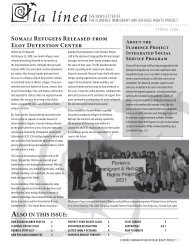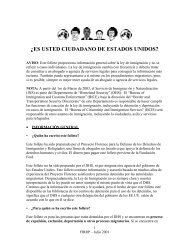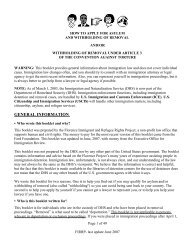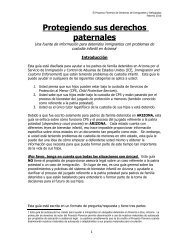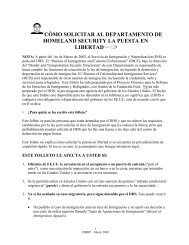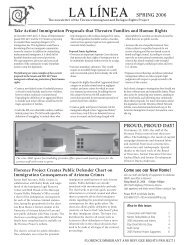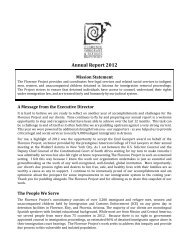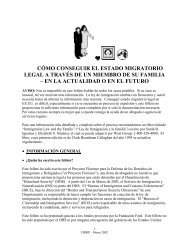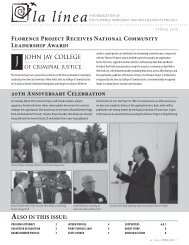quick reference chart and annotations for determining immigration ...
quick reference chart and annotations for determining immigration ...
quick reference chart and annotations for determining immigration ...
You also want an ePaper? Increase the reach of your titles
YUMPU automatically turns print PDFs into web optimized ePapers that Google loves.
Immigrant Legal Resource Center, Florence Immigrant <strong>and</strong> Refugee Rights Project,<br />
Maricopa County Public Defender August 2012<br />
Aggravated felony. Yes, except that the law is unclear regarding a conviction <strong>for</strong> giving away a<br />
“small amount” of marijuana <strong>for</strong> free. If this plea cannot be avoided, a record that conclusively<br />
establishes that the conviction was <strong>for</strong> giving away a small amount of marijuana at least will provide an<br />
argument to <strong>immigration</strong> attorneys.<br />
The rationale is as follows. The offense should not be classed as an aggravated felony because<br />
under 21 USC §841(b)(4), giving away a small amount of marijuana <strong>for</strong> free is a federal misdemeanor,<br />
<strong>and</strong> non-trafficking offenses are aggravated felonies only if they are analogous to federal felonies.<br />
However, the BIA stated that it would not honor this exception, but did so in a case where the immigrant<br />
had not proved that only a “small amount” was involved. Matter of Aruna, 24 I&N Dec. 452 (BIA 2008).<br />
It’s not clear what the outcome would be if a small amount had been proved in the criminal case. Counsel<br />
should attempt to avoid pleading to this offense, but if that is not possible counsel should make a record<br />
that the conviction was <strong>for</strong> giving away a small amount of marijuana. (Case law does not supply a<br />
specific amount.) Better yet would be a conviction <strong>for</strong> offering to give away a small amount of<br />
marijuana, because this would supply <strong>immigration</strong> counsel with two possible arguments.<br />
Other Grounds: Yes, as a ground of inadmissibility <strong>and</strong> deportability as an offense relating to<br />
controlled substances.<br />
78. Possession, use, administration, acquisition, sale, manufacture or transportation of dangerous<br />
drugs, ARS § 13-3407, or narcotic drugs, ARS § 13-3408<br />
Persons who knowingly<br />
(1) Possess or use a dangerous or narcotic drug.<br />
(2) Possess such a drug <strong>for</strong> sale.<br />
(3) Possess equipment or chemicals, or both, <strong>for</strong> the purposes of manufacturing such a drug.<br />
(4) Manufacture such a drug.<br />
(5) Administer such a drug to another person.<br />
(6) Obtain or procure the administration of such a drug by fraud, deceit, misrepresentation or subterfuge.<br />
(7) Transport <strong>for</strong> sale import into this state or offer to transport <strong>for</strong> sale or import into this state, sell,<br />
transfer or offer to sell or transfer such a drug.<br />
NOTE: On July 14, 2011, the Ninth Circuit prospectively overturned Lujan-Armendariz v.<br />
INS, 222 F.3d 728 (9th Cir. 2000), which had held that a single state drug possession conviction<br />
expunged pursuant to “rehabilitative relief” would not trigger removability as a controlled<br />
substance offense. See Nunez-Reyes v. Holder, 646 F.3d 684 (9th Cir. 2011) (en banc). There<strong>for</strong>e, a<br />
single conviction received on or after July 14, 2011 <strong>for</strong> simple possession, possession of<br />
paraphernalia, or another minor drug offense can no longer be eliminated <strong>for</strong> <strong>immigration</strong><br />
purposes by obtaining a set aside under ARS § 13-907.<br />
A single conviction <strong>for</strong> simple drug possession or possession of paraphernalia offense<br />
entered prior to July 14, 2011 may still be eliminated <strong>for</strong> <strong>immigration</strong> purposes under § 13-907 as<br />
long as the defendant did not violate probation. See Estrada v. Holder, 560 F.3d 1039 (9th Cir.<br />
2009). However, a conviction <strong>for</strong> use or under the influence of drugs will trigger removability as a<br />
controlled substance offense even if the conviction occurred prior to July 14, 2011. See Nunez-Reyes<br />
v. Holder, 646 F.3d at 695 (overruling Rice v. Holder, 597 F.3d 952 (9th Cir.2010)).<br />
Arizona Criminal Chart with Explanatory Endnote – August 2012<br />
93




